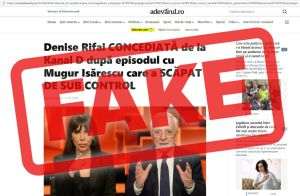Development through knowledge is fundamental to any modern state. The "Romania of Knowledge" project, dedicated to the development of the country through education, science, research and technology, vectors of progress and evolution of the economy, society and civilization, was launched by the Romanian Academy of Scientists, the National University of Science and Technology Politehnica Bucharest and "Carol Davila" University of Medicine and Pharmacy Bucharest, in the Hall of the "Carol I" Central University Library.
The President of the Romanian Academy of Scientists, Professor Adrian Badea, stated that the initiative is addressed to the decision-makers from whom they expect feedback: "We want this national project to be different from other scientific projects, which aim to organize national scientific conferences and international on certain issues. Knowing that the decisions, in any country in the world, are not made by scientists, but by politicians, we thought that through this project we should address certain current problems of Romania, because it is a project for Romania. But we also want the reverse connection, that is, when they have problems, decisions to make, they should turn to this project". Adrian Badea showed that within 10 days of the announcement of the project, over 35 institutions joined as partners, starting with the Ministries of Education, Research, Innovation and Digitization: "We want to offer a free, non-partisan expertise to the Government, the Parliament, the local administration , companies and especially SMEs, because none of us have any kind of political bias, we just want to be heard. Of course, we present a point of view. They make the decisions, because that's normal any country in the world. We hope it will be a successful project". The rector of the National University of Science and Technology Politehnica Bucharest, professor Mihnea Costoiu, welcomed the AOSR initiative and drew attention to the fact that it aims to alleviate numerous imbalances that our country is facing: "Romania is in a major demographic decline, there is also, a major economic impact as a result of the lack of qualified human resources. And we want to draw attention to this topic in the long term. There is a major impact in state decisions and we want to bring with us the enlightened minds of society The Romanian Academy, etc., in creating a long-term project. It is a project that will not end today." He also added that, as time will pass, the initiators of the project want to "put before the society more data, collected from open sources, from public data, projects, studies made by different international or national bodies", with which to be substantiated the proposed solutions that they will have in society in the next period. Mihnea Costoiu emphasized that the "Romania of Knowledge" initiative does not have a political connotation. According to rankings aimed at global indices of knowledge, such as pre-university education, technological education, higher education, research and development, telecommunications and information technology, economy, Romania "does not occupy good enough positions", highlighted the rector of the University of Medicine and Pharmacy " Carol Davila" Bucharest, professor Viorel Jinga.
According to the initiators, the "Romania of Knowledge" Project aims to create a national framework for the debate, a think-tank that will bring together representative personalities for each field involved, from the country and abroad, scientists, researchers, members of the academic body, experts and specialists, decision-makers and political leaders. Within this forum, fundamental fields and themes for the process of Romania's sustainable development through knowledge will be addressed.
The domains and thematic coordinates on which the "Romania of Knowledge" Project is structured are: Education; Research, Innovation; Communications, information technology and artificial intelligence; Efficient and sustainable development; Reindustrialization; Efficient and ecological agriculture; Health; Culture, civilization, spirituality; Energy and mineral resources; HR; Social politics; Ecology, Environment, Climate Change; Defence, public order and national security.

















































